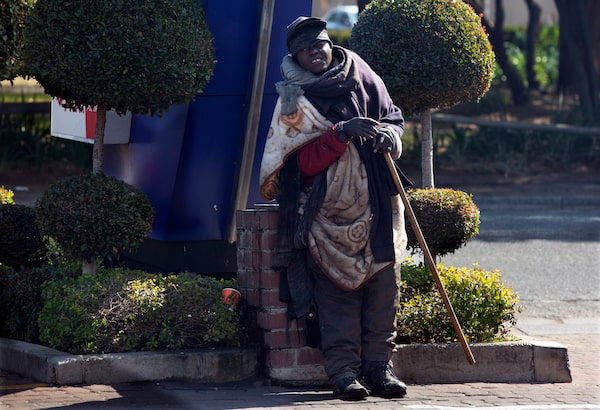
A homeless man stands at a street corner in Johannesburg on July 22, 2020. Official statistics show that South Africa's economy has sunk deeper into recession, with its gross domestic product for the second quarter of 2020 plummeting by 51 per cent, largely as a result of COVID-19 and the country's strict lockdown.Denis Farrell/The Associated Press
South Africa’s economy has sunk deeper into recession, with its gross domestic product for the second quarter of 2020 plummeting by 51 per cent, largely as a result of COVID-19 and the country’s strict lockdown, according to statistics released Tuesday.
South Africa imposed one of the strictest lockdowns in the world in April and May in response to the coronavirus outbreak, which has now claimed more than 15,000 lives and infected 639,362 people in the country.
The halt to most economic activity during the shutdown caused heavy declines in South Africa’s manufacturing, transport and retail sectors, according to the country’s statistics body StatsSA. South Africa has one of the largest and most developed economies in sub-Saharan Africa.
The country’s ban on trade in liquor and cigarettes also had an adverse impact on the economy during the period from April to June, with consumer spending on these items falling by 92 per cent, according to StatsSA. South Africa’s manufacturing output shrank by 74.9 per cent as factories stopped production, it said.
“Air travel came to a complete halt, contributing to the fall in economic activity in the transport and communication sector,” said the report. “The retail ban on alcohol sales and closure of tourist accommodation facilities were notable drags on trade activity.”
Some economists have warned that even though the COVID-19 outbreak was to blame for most of the decline, it simply exacerbated the economic crisis that South Africa was already experiencing.
South Africa’s unemployment rate is now at a record high of 30.1 per cent.
Since June the country has eased lockdown restrictions and gradually reopened the economy that is expected to decline by 7.2 per cent this year, according to government projections.
Miyelani Mkhabela, chief executive officer and chief economist at Antswisa Transaction Advisory Services, said he expects the country’s economic decline to be higher than anticipated. He predicted a contraction of more than 12 per cent by the end of 2020.
He called on the government to make immediate interventions to kick-start economic recovery by solving the country’s electricity crisis, which has now seen the return of scheduled power blackouts.
The country’s state-owned power utility, Eskom, has been beset with management problems and corruption allegations for years, and now struggles to supply enough power, plunging households and industry into rotating power cuts.
“If you look at the numbers, mining and manufacturing have suffered immensely and those are important sectors for us, which only work well when there is sufficient, affordable electricity,” said Mr. Mkhabela. “Energy is the lifeblood of every economy, so it needs to be high among the government’s priorities.”
He added that widespread allegations of corruption and ongoing revelations in an official investigation into graft are not helping the international perception of South Africa.
Be smart with your money. Get the latest investing insights delivered right to your inbox three times a week, with the Globe Investor newsletter. Sign up today.